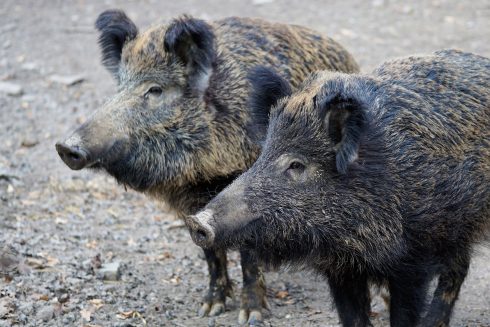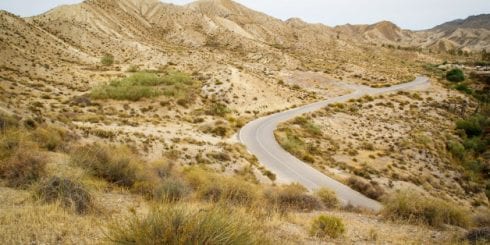Tired of mundane New Year resolutions? Instead of giving up smoking why not make some small lifestyle changes and help to save the planet. The Olive Press’ Rosie Sinclair, one of Al Gore’s Climate Project foot soldiers, shows you how.
“I THINK it is important for us to bring about some lifestyle changes,” Rajendra Pachauri explained to his interviewer in Oslo last month. As head of the Intergovernmental Panel on Climate Change, he had just received the 2007 Nobel Peace Award on behalf of his fellow scientists.
So what does he mean by ‘lifestyle changes?’ Do we all now follow the lead of that famous TV sit-com couple, Felicity Kendall and Richard Bryers, who turned their smart suburban home and garden into a self-sufficiency nightmare of chicken runs and manure powered generators?
Without doubt, we should all be doing something before governments put a crippling price on our carbon emissions. Yet, it is not always made clear how we might make that significant reduction of 60 per cent.
So, without turning us all into models of self sufficiency, I have put together a few New Year resolutions. We have tried and tested most of them at home. Some have driven us nearly insane: “Do you want the shutters open or shut?” “Quick, put a lid on the pan, you are wasting 90 per cent of the heat!” And others we are going to try out next year – like getting to Australia without using planes.
With acknowledgements to the Collins Gem Carbon Counter book, The Climate Project, and CRed-uk.org, here are some challenges for 2008:
Reduce vehicle carbon emissions
Car use is responsible for one tonne of carbon dioxide (CO2) per person per year and more than 25 per cent of car journeys are less than 3.5 kilometres.
- Get some fresh air and exercise by walking or cycling those short trips.
- Plan journeys to accomplish several errands at once.
- Achieve a saving of up to 30 pr cent by driving with style: accelerate and brake smoothly, cruise at a steady 90 kilometres per hour.
- Switch off when stationary.
- Keep your car well-maintained and carefully driven, with accurate tyre pressures, to save 13 per cent on fuel.
- At the next car change, opt for a low emission vehicle. The Opel Combo, for example, emits 130 gms CO2 per kilometre, compared to a Range Rover 4×4, emitting at 300 gms per km. The manufacture of a new car emits four tonnes of CO2.
Reduce my use of CO2 emitting butane and propane
Many of us are reliant on gas cylinders as a power source. A 12 kilogram bottle of butane emits approx 31.53 kg CO2, while a 13.5 kg bottle of propane emits approx 39.75 kg CO2.
- Switch off hot water boilers when not in use.
- Heat water to a maximum of 60 degrees Celsius.
- Reduce the number of hot baths taken. Use the shower instead (not power showers).
- Do not heat unused rooms.
- Throw on an extra sweater before turning up the gas space heater.
- If you are using a wood burning stove, keep a kettle of hot water simmering for drinks and washing up.
Reduce the energy used on lighting
Ordinary light bulbs use 80 per cent of their energy to give out heat. Halogen lamps are worse.
Change to energy savers. Each one will last eight to ten times longer, and consume one fifth of the energy.
Extend this change to outside security lights. Powerful security lighting consumes heaps of energy and pollutes the night skies.
Reduce heating and cooling energy in the home
Heating and cooling are our chief consumers of energy. Yet we lose up to one third of heating, and let in unwanted summer heat, through lack of insulation.
- Use shutters and curtains to reduce draughts during winter and unwanted sun in the summer.
- Turn off heating and cooling in rooms that are not in use.
- Adjust thermostats by 1 degree in summer and winter.
- Insulate to prevent 25 per cent of heat escaping through the roof.
- Double glaze to reduce heat loss by 70 per cent.
- Fit thermostats to respond to target temperatures.
- Burn wood from sustainable sources. Half a tonne of coal releases one tonne of CO2.
Cut carbon emissions caused by cooking
- Cover pans with a lid to reduce energy used by 90 per cent.
- Boil only the amount of water needed – 1 cup of hot water = 25 cups of CO2.
- Choose locally grown food, rather than imported
- Cool hot food before putting it in the fridge, and defrost regularly.
- Eat less meat: grazing land results in forests being cut down; methane (a global warming gas) is emitted from manure.
Reduce my travel carbon emissions
A feature of ex pat life is the need to travel to be with family and friends. By flying, we are responsible for more dangerous high altitude CO2 and water vapour (which also causes global warming).
- Plan trips to keep emissions as low as possible. Madrid to London by plane is 1,286 kg of CO2 per person; by train: 277 kg; by car and ferry: 912 kg (Portsmouth to Bilbao ferry: 799).
- Offset travel miles by contributing to projects. Climate Care is supplying eco friendly cooking stoves to Chinese families to replace their use of coal.
- Check out www.seat61.com. It is all about train travel, London to Australia overland and en suite cabins on cargo ships. If it was good enough for Art Garfunkel…
Feeling passionate about your environmental responsibilities, and intent on having an impact on manufacturing and industry? Try these:
Reduce my CO2 emissions by a few tonnes
- Do not regularly buy new cars. Reduce journeys and set up a car pooling scheme.
- Live near to your place of work.
- Almost halve your carbon footprint by sharing your home with a friend or lodger.
- Travel by bus and train whenever possible, or cycle and walk.
- Use sustainable energy to power your home.
- Use energy carefully and consciously so that you do not require large banks of solar panels and batteries, (the manufacture of them emits CO2).
- Switch off equipment, rather than use standby, and save 8 per cent of energy per year.
- Unplug phone chargers and save 35-70 kgs carbon per year.
- Only buy white goods with energy ratings of A and above to use one third less energy.
- Do laundry in cold water – yes, it works.
- Avoid using a tumble dryer and save 1.5 kg carbons per use.
- Be highly conscious about what you purchase. By-pass home furnishings fads. The average shopaholic adds three tonnes of CO2 to their carbon footprint each year, compared to 500 kgs from someone who buys minimally and uses seasonal products.
- Support local suppliers, growers and artisans.
- Give unwanted items an extended life by passing them on, and supporting charity shops.
- Recycle extensively. Even the humble used aluminium can is worth 95 pr cent of the energy needed to produce a new one.
- Decline wood or wooden furnishings unless you know it is from a sustainable source. Deforestation is causing at least 25 per cent of the world’s CO2 emissions annually.
- Plant trees to absorb CO2 and use them to provide natural shade.
- Do not use patio heaters. Two hours equates to using a car for a day.
- Offset your travel and other CO2 intensive activities.
And now something for the movers and shakers among us . . .
Create a local pressure group to combat climate change
The Junta has expressed concerns about the impact of climate change on our region, and invested money in research, projections and plans. Action by local Mayors should follow.
Here’s what to ask for:
- Information from your mayor and the councillor for medioambiente (environment) about their plans.
- Reductions in street lighting
- Bike lanes and pedestrian walkways.
- Extensive recycling and composting to reduce landfills. The resulting methane gases are twenty times more powerful than CO2.
- That the ayuntamiento uses only materials from sustainable sources.
- Information to residents about solar power grants.
- An insulation awareness campaign, saving up to one tonne of CO2 per home per year.
- The introduction of degradable plastic bags.
- Free climate change presentations via www.theclimateproject.org (English), or www.theclimateprojectspain.com (Spanish).
For more information on how to lessen your carbon footprint, go to the following websites
- www.climatecare.org
- www.cred-uk.org
- www.safeclimate.net
- www.resurgence.org/carboncalculator
- www.lowcarbonlife.net
- www.marklynas.org
- www.vcacarfueldata.org.uk
- www.transportdirect.info
Measure your own carbon footprint
www.direct.gov.uk/en/environmentandgreenerliving/actonco2/DG_067197
Click here to read more News from The Olive Press.







Over 400 Prominent Scientists Disputed Man-Made Global Warming Claims in 2007.
http://tinyurl.com/2dv6nz
You missed the most important part of Rajendra Pachauri’s message when he advised lifestyle changes. His number one recommendation was to stop eating meat because of the exceedingly high carbon footprint.
In Paris on Wednesday, Rajendra Pachauri, who is the head of the United Nations Nobel Prize winning Intergovernmental Panel on Climate Change (IPCC) encouraged the adoption of lifestyle changes to heal the planet. He stated, “Please eat less meat — meat is a very carbon intensive commodity.” He cited research showing that one kilogram of meat creates the equivalent of 36.4 kilograms of carbon dioxide. The also advised people to ride bikes and shop frugally to help heal the planet. “This is something that the IPCC was afraid to say earlier, but now we have said it.” http://afp.google.com/article/ALeqM5iIVBkZpOUA9Hz3Xc2u-61mDlrw0Q
The press has still not picked up on the UN Food and Agriculture’s November 2006 report from the LIVESTOCK group saying raising livestock — including the feed, the rainforest burned down to plant feed, the transportation, etc created more greenhouse gas emissions than all the transportation in the world, and that addressing the emissions from the livestock industry should be one of the top 2 – 3 environmental issues for governments world wide. (see Livestock’s Long Shadow).
Please! Gets some good vegan cook books and learn some delicious new recipes to help the planet!
Oops! My apologies, I just saw the “eat less meat” part buried at the bottom of reducing carbon emissions while cooking. Can you please move it up and highlight it? It is too important to bury at the bottom as thought it is a very small part of reducing our carbon emissions. Did you know that a University of Chicago study found that going vegan for one year reduced 50% more emissions than purchasing a Toyota Prius?
See “Vegetarian is the New Prius”
“They noted that feeding animals for meat, dairy, and egg production requires growing some ten times as much crops as we’d need if we just ate pasta primavera, faux chicken nuggets, and other plant foods. On top of that, we have to transport the animals to slaughterhouses, slaughter them, refrigerate their carcasses, and distribute their flesh all across the country. Producing a calorie of meat protein means burning more than ten times as much fossil fuels–and spewing more than ten times as much heat-trapping carbon dioxide–as does a calorie of plant protein. The researchers found that, when it’s all added up, the average American does more to reduce global warming emissions by going vegetarian than by switching to a Prius.
According to the UN report, it gets even worse when we include the vast quantities of land needed to give us our steak and pork chops. Animal agriculture takes up an incredible 70% of all agricultural land, and 30% of the total land surface of the planet. As a result, farmed animals are probably the biggest cause of slashing and burning the world’s forests. Today, 70% of former Amazon rainforest is used for pastureland, and feed crops cover much of the remainder. These forests serve as “sinks,” absorbing carbon dioxide from the air, and burning these forests releases all the stored carbon dioxide, quantities that exceed by far the fossil fuel emission of animal agriculture. ” http://www.commondreams.org/views07/0120-20.htm